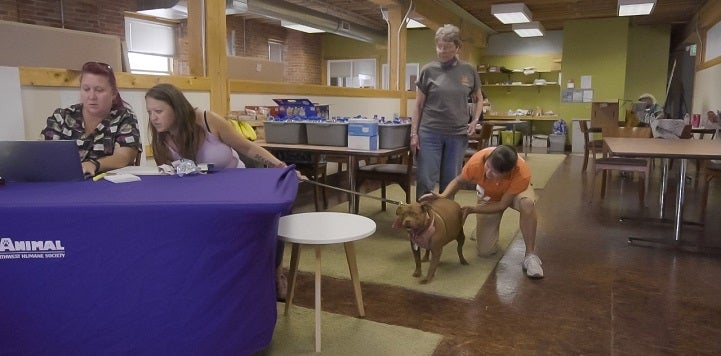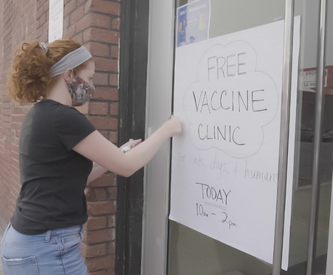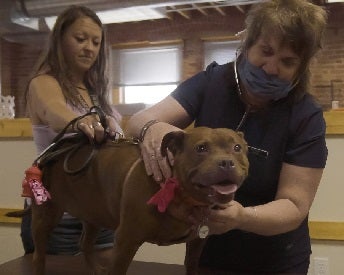
Spokane agencies collaborate to bridge gap between human/animal services
Last spring, we released a Pet Owner Surrender data analysis showing housing to be a major factor when it comes to animals being relinquished to shelters. Both during the pandemic and prior to it, between approximately 11% and 15% of those who had to give up their animals cited rental limitations, insurance restrictions and displacement/homelessness as the reason. But collaborations between human and animal service agencies are one way to serve both ends of the leash, and two agencies in Washington state are showing how it can be done.
“Everybody—both humans and animals alike—deserves safe and healthy housing,” says Elizabeth Oreck, national manager of housing initiatives. “That’s why we launched a new initiative last year focused on keeping pets and people together. Our first pilot was going to be with organizations on either side of the equation, and we found two in Spokane: Catholic Charities of Eastern Washington (CCEW) and SpokAnimal. They have turned out to be a great fit because they offer similar services to their respective clients.”
The pilot also turned out to be a great opportunity to show how two agencies can come together to serve the population while still fulfilling their individual missions.
The human support services side
CCEW is part of a national organization comprised of 167 agencies dedicated to providing everything from counseling to job training to emergency resources to people in need. It provides housing for more than 2,500 residents in the region and roughly 30% of them have animal companions. People who are chronically homeless also make up many of the organization’s clientele, and national estimates are that some 25% of people without a home have pets.
“Our clients are often people who are wondering, ‘Where am I sleeping tonight? Where am I getting food? Where am I using the restroom next?’,” says Dave Sackmann, CCEW’s director of integrated case management. “But we are also trying to build a foundation of stability for these folks and pets are a very important part of that.”
 While shelters are options for humans to get out of extremely hot or cold weather, they aren’t so for people who have animals. Likewise, when those clients need to go into the hospital or some form of residential treatment for addiction or mental health issues, not having a safe place for their animal companions to go is often an insurmountable barrier.
While shelters are options for humans to get out of extremely hot or cold weather, they aren’t so for people who have animals. Likewise, when those clients need to go into the hospital or some form of residential treatment for addiction or mental health issues, not having a safe place for their animal companions to go is often an insurmountable barrier.
“Our clients have to decide if they need housing or treatment enough to lose the relationship with their pet,” Dave says. “There are many people who make the decision not to seek shelter, which is hardly unreasonable when faced with such a choice.”
The animal support services side
While Dave was unsure where to go to find help for clients with pets, two miles down the road, SpokAnimal was offering relevant programs through its Guardian Angel program. In addition to ensuring that pets will be cared for if their people die, become incapacitated or lose their home, SpokAnimal also can provide short-term, temporary housing for animals whose people temporarily cannot take care of them.
But without the bridge between the two organizations, many Spokane-area people and their animals have not been accessing the resources they need.
“I'd always known the need was out there, but I never really had a partner who could tell me the true scope of the need,” says Dori Peck, SpokAnimal’s director of development.
 Now that the two agencies are working hand in hand, they have been adjusting their programs to suit the need. Knowing that the clients gained via CCEW would need lots of pet food (they go through 400-450 pounds of dry dog food per month), SpokAnimal expanded its food bank with donations from the community and local businesses. The food bank also includes various supplies such as leashes, muzzles, toys, treats and additional items, the funding for which was provided in part by Best Friends.
Now that the two agencies are working hand in hand, they have been adjusting their programs to suit the need. Knowing that the clients gained via CCEW would need lots of pet food (they go through 400-450 pounds of dry dog food per month), SpokAnimal expanded its food bank with donations from the community and local businesses. The food bank also includes various supplies such as leashes, muzzles, toys, treats and additional items, the funding for which was provided in part by Best Friends.
Staff from CCEW have a key to get into the shelter’s food bank at any time, and smaller resource banks were set up in each residential building so residents have easy access to supplies for their animals. Finally, vets at SpokAnimal spay or neuter and vaccinate clientele’s animals free of charge.
“Our job is to serve both the two- and four-legged, but we normally get deeply tied down with the animal aspect,” Dori says. “This partnership gives us a chance to get out and see how pets are impacting their people.”
In an unforeseen benefit of the alliance, SpokAnimal has allowed Catholic Charities’ clients who need work experience to work in their thrift shop. That includes people with criminal records who are rejected from all other work experience programs.
“That's the kind of thing we never even saw coming,” Elizabeth says. “That’s why I think these projects are so exciting. You can identify specific needs, but that can lead to providing other services that you didn't even know you needed.”
A collaborative approach
It’s been a year since the pilot launched and the impacts on Spokane-area pet lovers going through tough times has been significant.
“Our mission is to affirm the dignity of every person regardless of what they are going through,” says Dave. “If the relationship with their pet is something that is life-affirming, as a social services provider I don't want to get in the way of that. Having an expert who can help guide us through helping our clients with pets has been huge for us.”
For SpokAnimal, the partnership has given them the chance to keep more pets with their people instead of being relinquished to the shelter, which surprisingly opened new doors to the kinds of animals the shelter is helping.
“There was a young lady who needed to go into a residential program for treatment and she had a rabbit,” Dori says. “It’s awesome that she decided to get help so of course we wanted to make it possible for her to do that. Well, we’ve never taken in a bunny before so the whole staff was scrambling to find a cage, and then we were all running around town buying hay and supplies.
“We had that little bunny for about four months and the girl was able to come back and get him,” she adds. “And now, because we all fell in love with him, we will be opening a small animal room and will be taking in hamsters, guinea pigs and rabbits for adoption.”
Dori adds that she’s been so grateful for the program that she would love to help other cities set up something similar—and she may get her chance.
Best Friends has been talking with the national office of Catholic Charities (which so happens to be one of the largest housing providers in the country) to identify other potential areas that could use similar programs.
“Ultimately our goal is to increase pet-inclusive housing and look for opportunities to remove barriers so that pets stay with their people rather than end up in shelters,” Elizabeth says. “Whether that's intersecting with Catholic Charities or with another social services agency, there are many opportunities to collaborate.
“I really think we are going to look back and say one of the silver linings to come out of this crazy pandemic world we’re living in was that we figured out how to work together across our focus areas,” she adds. “Instead of saying ‘We are an animal welfare organization’ or ‘We are a human welfare organization,’ we recognized that we are all just community welfare organizations and that’s the only way that we truly can care for both ends of the leash.”

Liz Finch
Senior Writer
Best Friends Network
If you enjoyed this program spotlight, you can find our complete catalog of spotlights here.